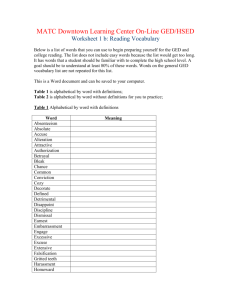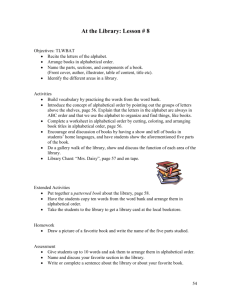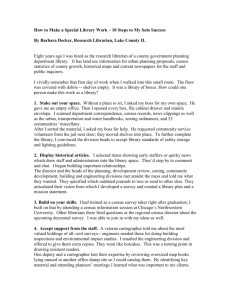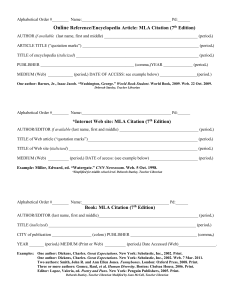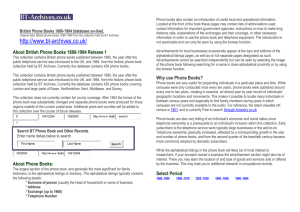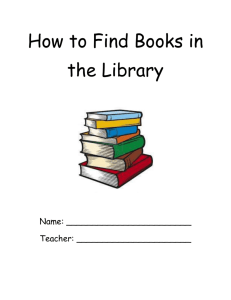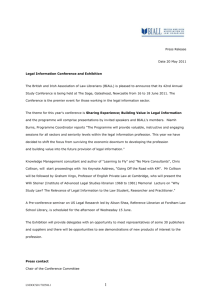Lesson Plan
advertisement
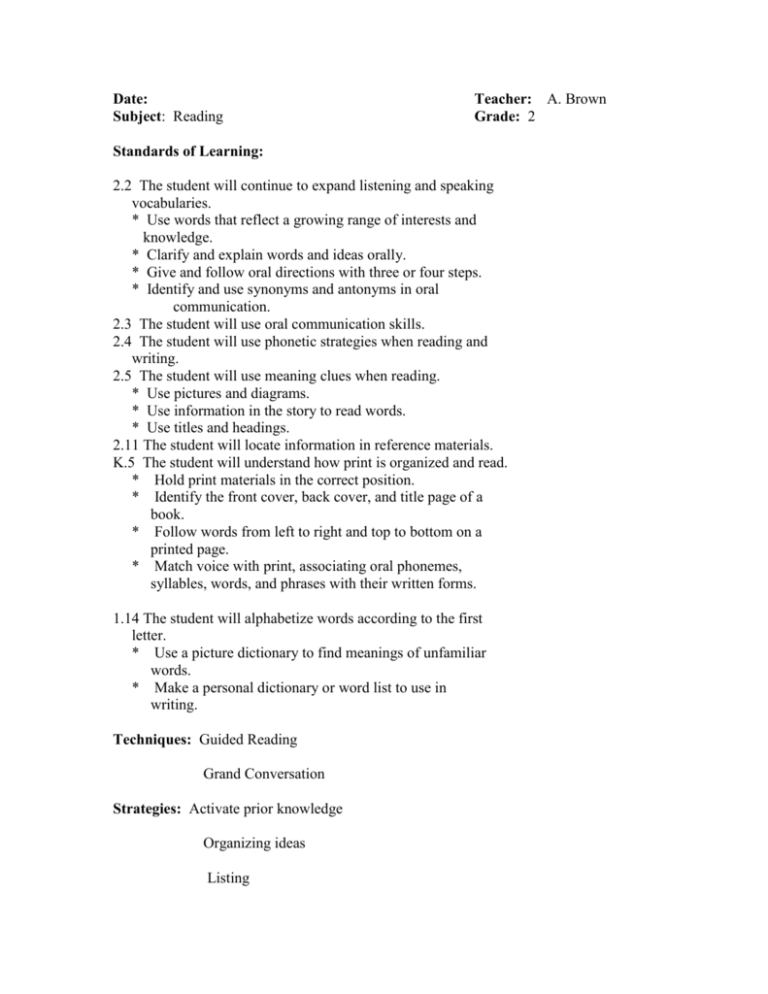
Date: Subject: Reading Teacher: A. Brown Grade: 2 Standards of Learning: 2.2 The student will continue to expand listening and speaking vocabularies. * Use words that reflect a growing range of interests and knowledge. * Clarify and explain words and ideas orally. * Give and follow oral directions with three or four steps. * Identify and use synonyms and antonyms in oral communication. 2.3 The student will use oral communication skills. 2.4 The student will use phonetic strategies when reading and writing. 2.5 The student will use meaning clues when reading. * Use pictures and diagrams. * Use information in the story to read words. * Use titles and headings. 2.11 The student will locate information in reference materials. K.5 The student will understand how print is organized and read. * Hold print materials in the correct position. * Identify the front cover, back cover, and title page of a book. * Follow words from left to right and top to bottom on a printed page. * Match voice with print, associating oral phonemes, syllables, words, and phrases with their written forms. 1.14 The student will alphabetize words according to the first letter. * Use a picture dictionary to find meanings of unfamiliar words. * Make a personal dictionary or word list to use in writing. Techniques: Guided Reading Grand Conversation Strategies: Activate prior knowledge Organizing ideas Listing Skills: Sequencing Increase sight word vocabulary Increase meaning vocabulary Increase vocabulary Locate specific information Sort in alphabetical order Follow directions General Objectives: The student will: 1. Go to the library 2. Listen to a lecture on alphabetizing 3. Listen to the book Librarians Community Workers 4. Participate in a discussion on librarians 5. Utilize alphabetizing skills with words 6. Utilize alphabetizing skills in the library to find books Specific Objectives: The student will: 1. Go to the library 2. Sing the alphabet song 3. Have a grand conversation about how to alphabetize words 4. Take the paper with the word on it and make an alphabetized line of words 5. Take the cut out spelling words and alphabetize them individually 6. Listen to the story, Librarians Community Workers 7. Listen to the librarian talk about her duties and listen to her explain the new vocabulary words on the board about her job 8. Locate the book of your choice in the library using the card catalog or by using the computer catalog Procedures for the teacher: Before Reading: 1. Discuss with the students the trip to the library including listening skills, appropriate behavior, and what they will be learning at the library. 2. Go to the library 3. Sing the alphabet song as a class 4. The students will be taken on a tour of the library and shown how alphabetical order is utilized. The students will then be asked to participate in a grand conversation on how we alphabetize words. 5. The teacher will then pass out a piece of construction paper with a word on it to all of the students. The students will then try to put all the words in alphabetical order by standing in the order next to each other in a line. 6. When the teacher checks the order of the students, one by one she will dismiss them back to their seats with a bag of library words cut into individual pieces of paper so only one word is on a strip of paper. The words will be scanner, library catalog, audiovisual equipment, microfilm readers, librarian, books, videos, and encyclopedia. 7. The students will independently put their cut up library words in alphabetical order During Reading: 8. Conduct a guided reading experience. Read the story aloud to the students. After page five ask, “How do librarians find books easily?” After page 15 write the bolded words on the board. Ask the students what each word means, such as scanner, library catalog, audiovisual equipment, and microfilm readers. Once page 23 is read add the word literature to the vocabulary list on the blackboard. Ask what the word literature means. After reading page 25 ask who would like to be a librarian and why. After Reading: Respond to the text: 9. The librarian will talk about her duties. She will explain and/or show the vocabulary words on the blackboard. She will show the students where to find certain books in the library. She will explain why the library alphabetizes the books. She will show them how to locate books and how to check them out. Exploring the text: 10. The students will then explore the library independently. They will walk around and look at the different books. They will see what opportunities the library offers that they can take advantage of. Applying the text: 9. The student’s will chose a book from the library to check out and take home. They will locate the book of their choice by using the card catalog or computer catalog. Closing: The lesson will end by having all the students come together with the book they checked out and discussing the procedures they went through to find their books. They will review over what the words on the board mean also. Evaluation: During this lesson the teacher will evaluate the students’ ability to listen and answer questions during the story. They will be assessed by how well they answer the questions on the new vocabulary words about the library. The teacher will also observe the students while they arrange themselves in alphabetical order with their construction paper word. They will also be assessed when they arrange their spelling words in alphabetical order. The final evaluation will be based on each student’s ability to find the library book of his or her choice and successfully check it out. Materials: 1 piece of construction paper per student with a different word written on each, library word bags, library, library books, chalkboard Extension: Have the students put their spelling words in alphabetical order for homework occasionally. Have the students continue to go to the library and locate certain books on a regular basis to practice their alphabetizing skills.
